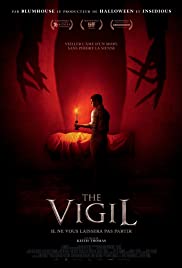
THE VIGIL
US, 2019, 89 minutes, Colour.
Dave Davis, Menashe Lustig, Malky Goldman, Lynn Cohen, Fred Melamed, Ronald Cohen.
Directed by Keith Thomas.
Vigil, in the past, has possessed religious connotations. And so it has here.
This is a horror film with a difference. Dialogue is in English but much of it in Yiddish. While it is set in New York City, it is set within the Jewish community, giving an initial explanation of the ritual of keeping vigil by a dead body, keeping guard over the body, a comforting presence for members of the family. The name of the person keeping vigil, the technical name is Shomer. So, the audience is prepared for this kind of vigil and whatever may happen. Pre-credits, there is an additional teaser with some dark and images from the concentration camps, a victim, an official, a man with a gun ready to shoot (with the scene returning towards the end of the film).
There is a transition to a group of young Jewish men and women in a room, discussing, quite earnestly, some situations in which they have found themselves. Audience attention is drawn to one young man, Yacov (Dave Davis, not the most Jewish name), seen looking at himself in a mirror, studiously, then taking some medication. As the group disperses, they notice a rabbi standing by lamppost in the street. As they exit, and Yacov exchanges phone numbers with one of the young women, Sarah, the rabbi approaches him with a proposition. He needs a Shomer, and offers the job to Yacov – and we learn soon enough that Yacov was a very devout, Orthodox, a Shomer, but seems to have lost his faith, has become quite secular, especially in his money deal for payment to be a Shomer.
The dead man is Mr Litvack, a reclusive man, mourned by his wife who has Alzheimer’s. While it is uncomfortable, Yacov has been a Shomer before, and is persuaded to settle in for a vigil of five hours before the mortician’s arrive.
It is dark inside the house and, of course, some of the lights will flicker and fail. The camera goes often to the clock, time passing quickly, then not… The setting has its effect on Yacov as he gazes at the body covered by a sheet, looks around the room, checks with his mobile phone, making some contact with Sarah.
But, as the night progresses (or regresses for Yacov), he is sometimes asleep, sometimes awake, sometimes awake in his sleep, nightmare experiences, tormenting memories, upsetting imagination. He especially recalls an incident where he accompanies, wearing his Orthodox locks and hat, a young boy down the street when they are attacked by a group of men, Yacov pushed to the ground, recovering his hat, but immobile to help the young boy, guilt continuing to weigh on him. Mrs Litvack appears during the night in disturbing ways. The body seems to disappear under the sheet but returns. And there is blood on it covering its head. The concentration camp scene recurs.
Yacov has had his mental and emotional problems, phones his therapist and leaves a message – and the mystery of a therapist bring back with detailed instructions, then the real therapist returning the call.
Which means then that the audience shares Yacov’s vigil, shares his mental and emotional situation, sees a film in the basement where the dead man talks about the effect of demons and their reaching out.
Day dawns. New York seems normal. But, of course, it is not.
1. An American- Yiddish horror story?
2. The New York setting? The group meeting? The streets? The houses, exteriors? Interiors? The musical score and atmosphere?
3. The insertion of flashbacks, concentration camps? To fantasies within the house? To memories in the street and the attack? To the fantasies within Yacov’s mind?
4. The initial explanation? The Shomer and the Jewish ritual? Significance? The dead person and family?
5. The initial indication of the concentration camps, as a teaser as to what was to follow?
6. The group, friends, the discussions, their experiences, Yacov in this context? Looking in the mirror, taking his tablets?
7. The rabbi at the lamppost, his accosting Yacov, his mission? Persuasive? Yacov and his reaction, and willing? Yacov and his loss of faith? His mental state? Bargaining for the money? Going to the house, meeting Mrs Litvack? Her unwillingness to have him? His settling in?
8. The five hours, sitting in the room, the clocks, Mrs Litvack’s return, her accosting him, discussions with him, her effect on him? The memories of the concentration camp? Memories of her husband? The shootings? His lying dead, the vigil? The basement, the film, his explanations of the Demons?
9. The effect on Yacov, his sleeping, dreams and nightmares, waiting? The mixture of both?
10. The memories with the boy in the street, walking home, the men attacking, hitting him, his hat, his being helpless, unable to save the boy? Weighing on his conscience?
11. The mobile phones, the continued contact, the discussion with Sarah as he left the meeting, promise for contact? The phoning, face time? His phoning his psychiatrist? The advice? The real psychiatrist ringing? Questions?
12. His injuries, the drinking and his imagination, the broken glass? Mr Litvack’s body disappearing under the sheet, returning, the blood on the head?
13. The cumulative effect of all these experiences? Daylight? The rabbi coming?
14. The effect of the vigil on Yacov? On the audience?